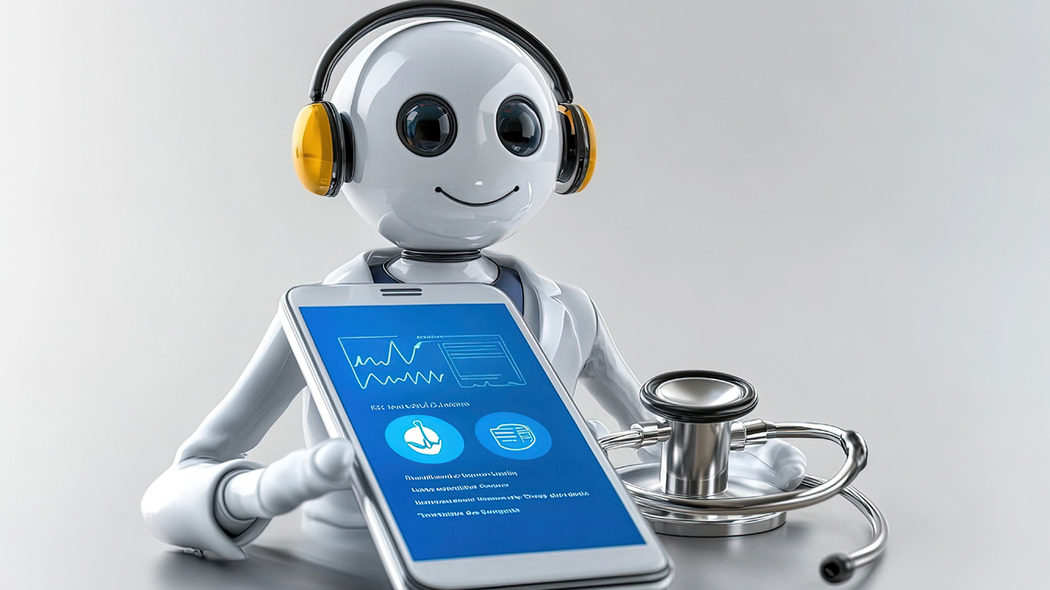The application of artificial intelligence (AI) in healthcare has sparked many new ideas, with the use of virtual AI assistants to support doctors and nurses being one of the most important. These intelligent systems are transforming the way people communicate with their doctors, making healthcare more accessible, faster, and better tailored to individual needs. Traditional healthcare relies on in-person meetings or phone calls. Virtual AI assistants, on the other hand, provide 24/7 support.
They can answer patient questions, schedule appointments, and even monitor patients’ health in real time. They aim to simplify and speed up communication between patients and medical staff, providing patients with accurate information while streamlining doctors’ work. This technology not only increases patient satisfaction but also improves healthcare outcomes by accelerating physician action. With the growing demand for healthcare and a shortage of medical professionals, virtual AI assistants are becoming a crucial tool for delivering high-quality care to the general public.
Enabling Greater Patient Engagement and Better Communication:
Thanks to the rise of AI virtual assistants, the way people communicate with their doctors is undergoing a significant transformation. Where patients once had to wait days for answers to simple questions or to schedule an appointment, these problems can now be resolved over the phone. AI-powered voice assistants and chatbots can now instantly answer a wide range of questions, from medication administration to post-operative care. When patients have immediate access to accurate health information, they can become more proactive in managing their health.
For example, AI assistants can remember to take medications at the right time, guide them in monitoring symptoms, and refer them to a doctor when needed. These systems can also provide support in multiple languages, making communication easier for non-English speakers. Through continuous two-way communication, AI virtual assistants help build trust, keep patients informed, and encourage them to adhere to their treatment plans. This ultimately leads to better health outcomes.
Streamlining Administrative Tasks in Healthcare:
A significant advantage is that AI virtual assistants can handle time-consuming administrative tasks. They can automate tasks such as scheduling appointments, reminding patients, verifying insurance information, and updating medical records. This frees up healthcare staff to focus on patient care. A patient can simply ask a virtual assistant, “Schedule a checkup for next Tuesday,” and the system will check the doctor’s availability, confirm the appointment, and send a reminder—all without human intervention.
This efficiency reduces the chance of patients missing their appointments and helps clinics maintain a stable workflow. Large hospitals can become overwhelmed by the sheer volume of patients, but AI-powered scheduling systems can optimize existing resources and maximize the utilization of doctors, nurses, and hospital buildings. By relieving medical staff of mundane, repetitive tasks, AI virtual assistants can help healthcare institutions operate more efficiently and prevent burnout among healthcare workers.
Supporting Chronic Disease Management and Remote Care:
AI virtual assistants are becoming a crucial component of telemedicine, enabling remote patient monitoring, particularly for people with chronic conditions. Both patients and healthcare professionals spend significant time regularly visiting these patients, tracking their symptoms, and adjusting their medications. Much of this work can be automated by AI assistants, which collect health data from wearables, mobile apps, and patient records, and then monitor for signs of improvement or deterioration.
For example, an AI assistant for a diabetes patient could monitor their blood sugar levels in real time and alert the patient and doctor if they are too high or too low. AI systems can also track healing progress after surgery and make recommendations for wound care or rehabilitation exercises. AI virtual assistants can proactively reduce readmissions, improve quality of life, and make chronic disease management more efficient and patient-focused.
Improving Personalized Patient Care:
One of the key capabilities of AI virtual assistants is providing highly personalized care. AI systems differ from traditional medical helplines because they can use information such as electronic health records, previous appointments, wearable health devices, and lifestyle habits to provide personalized recommendations for each patient. For example, if a patient has a history of high blood pressure, an AI assistant can provide personalized meal plans, exercise recommendations, and medication reminders to lower blood pressure.
Over time, the assistant learns through interactions with the patient and adjusts the recommendations based on their health condition or care situation. This personalized approach not only helps patients better follow their doctor’s advice but also helps them choose a healthier lifestyle. AI virtual assistants thus act as a constant, intelligent companion throughout a patient’s entire care journey, supporting human doctors with real-time, data-driven assistance.
Conclusion:
AI virtual assistants are no longer just a futuristic concept; They are a reality that is transforming patient care. These intelligent systems make care easier, faster, and more patient-focused. They achieve this by streamlining administrative tasks, improving communication and engagement, supporting long-term care, and providing personalized health recommendations. They free up doctors and nurses to manage more complex cases and ensure patients receive fast, accurate, and personalized care. As technology advances, AI virtual assistants will play an even greater role. They will be able to collaborate with more advanced diagnostic tools, wearable technology, and predictive analytics to identify health problems before they worsen. This is a significant step toward a care model that is both reactive and proactive, helping patients worldwide receive better care. In the future, patient care will depend on how human interaction and AI intelligence work together to keep people healthy and happy.
FAQs:
1. What is an AI virtual assistant in a hospital?
In healthcare, an AI virtual assistant is a software system that uses AI to help people with tasks such as scheduling appointments, obtaining medical advice, and managing their health.
2. How do AI virtual assistants make it easier for patients to communicate with you?
They can answer patients’ questions in a timely and accurate manner, remind them to monitor their health, and encourage them to actively participate in their care by having regular conversations.
3. Can AI-powered virtual assistants help people with chronic illnesses?
Yes, they can track symptoms, access health data from wearable devices, and send alerts or instructions to patients and healthcare professionals, enabling them to take the right action at the right time.
4. Are AI-powered virtual assistants secure and private?
Most AI medical assistants comply with data security regulations, meaning patient data is encrypted and processed securely.
5. Will AI-powered virtual assistants replace real doctors?
No. They are designed to work alongside human physicians, performing routine tasks and providing additional support while physicians focus on diagnosis, treatment, and more challenging cases.




